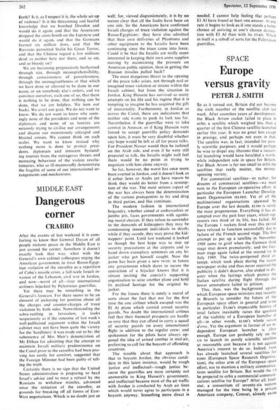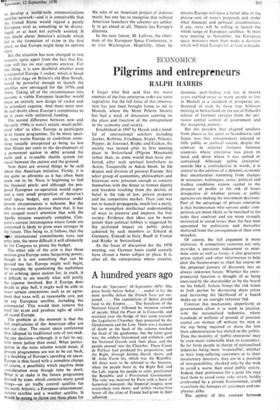SPACE
Europe versus gravity
PETER J. SMITH
So as it turned out, Britain did not become the sixth member of the satellite club last
week. After countless years of development, the Black Arrow rocket failed to place in orbit a satellite which weighed less than a quarter of the first Chinese satellite launched
earlier this year. It was no great loss except in prestige, and perhaps not even in that.
The satellite was, in fact, intended for pure-
ly scientific purposes; and it would perhaps be wise to dispel any illusions that a success.
ful launching would have heralded a worth. while independent role in space for Britain. For Black Arrow is far too small to orbit the satellites that really matter, the money- spinning variety.
For commercial satellites—or rather, for dreams of commercial satellites—we must turn to the European co-operative effort. in particular the European Launcher Develop. ment Organisation (ELDO). Yet of all the multinational organisations spawned by Europe over the last decade, ELDO is surely the most preposterous. Everything it has at- tempted over the past four years, which rep- resents two third of its life, has failed. All the Europa 1 rockets fired over this period have refused to function successfully due to failure of the French second stage. The first attempt to put up a satellite in November 1968 came to grief when the German third stage shut down prematurely; and the Ger- man stage again failed at the second try in July 1969. The twice-postponed third at- tempt, which took place during the recent newspaper strike and thus never received the publicity it didn't deserve, also ended in dis- aster when the fairings which protect the Italian satellite during flight through the lower atmosphere failed to jettison. This, then, was the background against which European space ministers met recently in Brussels to consider the future of the European space effort in general and ELDO in particular. Emo's impeccable history of total failure inevitably raises the question of the viability of a European launcher at all—in other words, ELDO'S whole raison d'etre. Yet the argument in favour of an in- dependent European launcher is clear enough. Europe can probably rely on the us to launch its purely scientific satellites at reasonable cost because it is not against America's interest to do so. Indeed, NASA has already launched several satellites for ESRO (European Space Research Organisa- tion), the other arm of the European space effort, not to mention a military communica- tions satellite for Britain. But would the IS be prepared to orbit a commercial communi- cations satellite for Europe? After all, Intel- stat, a consortium of seventy-six nations managed for the time being by a private American company, Comsat, already exists
to develop a world-wide communications satellite network—and it is conceivable that the United States would regard a purely European rival as something to be discou- raged, or at least not actively assisted. It
was doubt about America's attitude which led to the formation of Elmo in the first place, so that Europe might keep its options open. But the situation has now changed in two respects, quite apart from the fact that Eu- rope still has no real options anyway. For one thing, it is now doubtful whether even a successful Europa 1 rocket, which is based in its first stage on Britain's old Blue Streak, would be powerful enough to launch the
satellites now envisaged for the 1970s and
1980s. Taking all of the circumstances into account, a viable European launcher would mean an entirely new design of rocket and its attendant expense. And there must now be real doubt about Europe's competence to do it, even with unlimited funding.
The second difference between now and the early 1960s is NASA'S recent, much-publi- cised 'offer' to allow Europe to participate in its future programme. To be more speci- fic. NASA wants Europe to contribute some- thing (usually interpreted as being no less than fifteen per cent) to the development of a permanent station in orbit around the earth and a re-usable shuttle system for travel between the station and the ground.
Now there are several things to be said about this American initiative. Firstly, it is not quite so altruistic as it has often been made out to be. NASA is beginning to feel the financial pinch; and although the pro- posed European co-operation' would repre- sent a very small proportion of America's total space budget, any assistance under present circumstances is welcome. But the offer is even more devious than that. It has not escaped NASA's attention that with the Apollo mission essentially complete, Con- gress's current intransigence where funds are concerned is likely to grow even stronger in the future. This being so, it follows that the wirre international commitments NASA can enter into, the more difficult it will ultimately be for Congress to prune the budget.
The other side of the coin is that these motives give Europe some bargaining power, though it is not something that can be pressed too far. Europe might well begin, for example, by questioning the usefulness of an orbiting space station for, in truth, it is difficult to see exactly what will justify the expense involved. But if Europe does decide to play ball, it might well be able to exact certain concessions such as an agree- ment that NASA will, at reasonable cost, put up any European satellite, including the commercial. This would then remove the need for ELDO and produce sighs ol relief all round Europe.
The problem at the moment is that the full implications of the American offer are not yet clear. The recent space conference thus adopted its traditional role of not mak. ing any decision—although, it is fair to say, with more justice than usual. What partici- pation in the NASA scheme would mean, if present programmes are not to be cut back. Is a doubling of Europe's spending on space. Europe is thus faced with a complete change of course, a possibility which requires deep consideration even though time be short. What is at stake is the future programme devised by asap, which contains many good things--an air traffic control satellite for the north Atlantic, a European telecommuni- cations satellite and a weather satellite. It Would be wrong to throw out these plans for
the sake of an American project of dubious merit; but one has to recognise that without American launchers the schemes are unlike, ly to go ahead at all. Therein lies Europe's dilemma.
In the near future, M. Lefivre, the chair- man of the European Space Conference, is to visit Washington. Hopefully, when he
returns Europe will have a better idea of the precise cost of NASA'S proposals and under what financial and political circumstances. if any, NASA will be willing to launch the whole range of European satellites. At their next meeting in November, the European space ministers must then make a decision which will bind Europe for at least a decade.















































 Previous page
Previous page